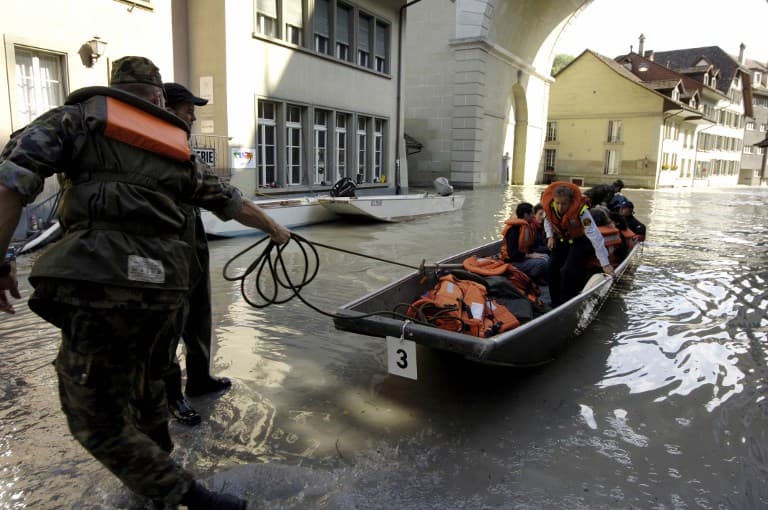Flood danger high after record winter snow in Switzerland

Experts warn that record snowfall in parts of Switzerland this winter could lead to serious flooding if the spring is warm and wet.
January was an odd month for weather in Switzerland. While parts of the country experienced record warm temperatures, there was also serious snowfall in the country’s south-west.
A record-breaking 8–9 metres of new snow was registered in January on the Great St. Bernard Pass which connects the Swiss canton of Valais with Aosta in Italy, to give one example.
This heavy snowfall has already led to an increase in avalanche risk: two people were rescued in Valais on Sunday after being caught in an avalanche, while the road linking the resort town of Zermatt with the rest of the world has been closed three times this winter because of avalanche risks.
But experts warn the heavy snow could cause far more serious problems in coming months if Switzerland experiences a wet and warm spring.
“The potential for flooding is very high. Depending on the weather and the process of [snow and ice] melting, there could be large water flows in the Rhone catchment area,” David Volken of the Swiss Federal Office for the Environment told the SonntagsBlick newspaper.
The hydrologist said the current situation reminded him of 1999 when Basel saw once-in-a-century flooding. “We could also have an extreme weather event [like that] this year if the spring is wet and warm,” Volken said.
Experts also warn that extreme weather events could become more frequent in future in Switzerland, with Volken saying January’s record temperatures are the result of climate change.
Those high temperatures lead to heavy snowfall in parts of Valais, while a higher-than-usual snow line increased the incidence of landslides in the Oberwallis region of the canton.
“Unfortunately, hopes that we had seen peak greenhouse gas emissions were dashed last year,” climate researcher Thomas Stocker with the University of Bern told the SonntagsBlick.
Stocker said humans had upset the energy balance of the planet, with higher atmospheric temperatures leading to stronger storms and heavier rain.
“We will experience greater rain or snowfalls in coming years. At the same time, higher temperatures will make the snow heavier. This domino effect will have a large influence on life in the Alps,” said the climate researcher, explaining this would increase the risk of large landslides.
Comments
See Also
January was an odd month for weather in Switzerland. While parts of the country experienced record warm temperatures, there was also serious snowfall in the country’s south-west.
A record-breaking 8–9 metres of new snow was registered in January on the Great St. Bernard Pass which connects the Swiss canton of Valais with Aosta in Italy, to give one example.
This heavy snowfall has already led to an increase in avalanche risk: two people were rescued in Valais on Sunday after being caught in an avalanche, while the road linking the resort town of Zermatt with the rest of the world has been closed three times this winter because of avalanche risks.
But experts warn the heavy snow could cause far more serious problems in coming months if Switzerland experiences a wet and warm spring.
“The potential for flooding is very high. Depending on the weather and the process of [snow and ice] melting, there could be large water flows in the Rhone catchment area,” David Volken of the Swiss Federal Office for the Environment told the SonntagsBlick newspaper.
The hydrologist said the current situation reminded him of 1999 when Basel saw once-in-a-century flooding. “We could also have an extreme weather event [like that] this year if the spring is wet and warm,” Volken said.
Experts also warn that extreme weather events could become more frequent in future in Switzerland, with Volken saying January’s record temperatures are the result of climate change.
Those high temperatures lead to heavy snowfall in parts of Valais, while a higher-than-usual snow line increased the incidence of landslides in the Oberwallis region of the canton.
“Unfortunately, hopes that we had seen peak greenhouse gas emissions were dashed last year,” climate researcher Thomas Stocker with the University of Bern told the SonntagsBlick.
Stocker said humans had upset the energy balance of the planet, with higher atmospheric temperatures leading to stronger storms and heavier rain.
“We will experience greater rain or snowfalls in coming years. At the same time, higher temperatures will make the snow heavier. This domino effect will have a large influence on life in the Alps,” said the climate researcher, explaining this would increase the risk of large landslides.
Join the conversation in our comments section below. Share your own views and experience and if you have a question or suggestion for our journalists then email us at [email protected].
Please keep comments civil, constructive and on topic – and make sure to read our terms of use before getting involved.
Please log in here to leave a comment.